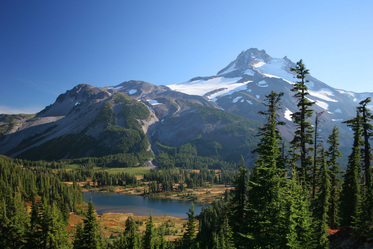|
In this Mountain (Isaiah 25:6-9) by Tami Jelinek  Mt. Jefferson in
the Oregon Cascades
Recently I observed someone quoting a portion of Isaiah 25:8, isolated from even its immediate context, and implying that it was a promise which had yet to be fulfilled. The section quoted was this:
“…and the rebuke of his people shall he take away from off all the earth.” Now, I am not sure what the person envisions to be a future (not accomplished by the cross) fulfillment of the removal of the “rebuke” of God’s people from “all the earth.” I could only speculate. But perhaps he envisions a time when anti-Semitism will be eradicated from the world (as if those calling themselves “Jews” today are using the term in a Biblically correct sense). Or, maybe he dreams of a time when Christians, and Christianity, won’t be mocked on Saturday Night Live; or when monuments to the Ten Commandments (the ordinances which were blotted out and nailed to the cross according to Colossians 2:14) will be erected in secular courthouses across America. As is the case any time we attempt to interpret Bible prophecy according to the lead story on Fox News, the speculation could go on indefinitely. In fact, when we separate these prophecies from their contexts, and ignore the analogy of Scripture, they could, and do, end up meaning all things to all people. Or, as John Owen put it, they “have no meaning at all.” What does the prophet mean when he foretells, “the rebuke of His people shall He take away from off all the earth?” Let’s examine the immediate context of this statement, verses 6-9: Isaiah 25:6 And in this mountain shall the LORD of hosts make unto all people a feast of fat things, a feast of wines on the lees, of fat things full of marrow, of wines on the lees well refined. 7 And he will destroy in this mountain the face of the covering cast over all people, and the vail that is spread over all nations. 8 He will swallow up death in victory; and the Lord GOD will wipe away tears from off all faces; and the rebuke of his people shall he take away from off all the earth: for the LORD hath spoken it. 9 And it shall be said in that day, Lo, this is our God; we have waited for him, and he will save us: this is the LORD; we have waited for him, we will be glad and rejoice in his salvation. Notice first that the fulfillment of this prophecy occurs “in this mountain.” What mountain? I contend it is referring to the one and only mountain of the Lord, or Mt. Zion. Scripture clearly defines Mt. Zion as the church of Jesus Christ. The Old Testament prophets predicted that God would dwell and be at rest in Mt. Zion: Psalm 132:13 For the LORD hath chosen Zion; he hath desired it for his habitation. 14 This is my rest for ever: here will I dwell; for I have desired it. 15 I will abundantly bless her provision: I will satisfy her poor with bread. 16 I will also clothe her priests with salvation: and her saints shall shout aloud for joy. The apostles assure us that God dwells in His people, who corporately (in the church) have become his habitation: Ephesians 2:20 [You] are built upon the foundation of the apostles and prophets, Jesus Christ himself being the chief corner stone; 21 In whom all the building fitly framed together groweth unto an holy temple in the Lord: 22 In whom ye also are builded together for an habitation of God through the Spirit. Compare Paul’s description of the church as a temple built for a habitation of God to John’s description of the heavenly Jerusalem: Revelation 21:9 And there came unto me one of the seven angels which had the seven vials full of the seven last plagues, and talked with me, saying, Come hither, I will shew thee the bride, the Lamb's wife. 10 And he carried me away in the spirit to a great and high mountain, and shewed me that great city, the holy Jerusalem, descending out of heaven from God…14 And the wall of the city had twelve foundations, and in them the names of the twelve apostles of the Lamb. And of course Hebrews makes it clear that the church, the heavenly Jerusalem, is Mt. Zion, and we are there now: Hebrews 12:22 But ye are come unto mount Sion, and unto the city of the living God, the heavenly Jerusalem, and to an innumerable company of angels, 23 To the general assembly and church of the firstborn, which are written in heaven, and to God the Judge of all, and to the spirits of just men made perfect, 24 And to Jesus the mediator of the new covenant, and to the blood of sprinkling, that speaketh better things than that of Abel. Therefore, we immediately conclude that the place, “in this mountain,” where God has removed the rebuke of His people, is the church. In addition to the where statement, “in this mountain,” we also see in this context a clear when statement in the phrase “in that day.” It is indisputable that “in the day” God removes the rebuke of His people, all of the other elements in this context are fulfilled as well. What else is taking place “in this mountain” when the rebuke of God’s people is taken away? A Feast of Fat Things Isaiah 25:6 And in this mountain shall the LORD of hosts make unto all people a feast of fat things, a feast of wines on the lees, of fat things full of marrow, of wines on the lees well refined. All through the prophets, the Kingdom of God, or the New Heavens and New Earth, is described as a land of fatness and plenty, where hunger and thirst are freely satisfied: Isaiah 55:1 Ho, every one that thirsteth, come ye to the waters, and he that hath no money; come ye, buy, and eat; yea, come, buy wine and milk without money and without price. 2 Wherefore do ye spend money for that which is not bread? and your labour for that which satisfieth not? hearken diligently unto me, and eat ye that which is good, and let your soul delight itself in fatness. 3 Incline your ear, and come unto me: hear, and your soul shall live; and I will make an everlasting covenant with you, even the sure mercies of David. Revelation 22: 17 And the Spirit and the bride say, Come. And let him that heareth say, Come. And let him that is athirst come. And whosoever will, let him take the water of life freely. Jesus chastised those who looked for a physical fulfillment of these promises: John 6:26…Ye seek me, not because ye saw the miracles, but because ye did eat of the loaves, and were filled. 27 Labour not for the meat which perisheth, but for that meat which endureth unto everlasting life, which the Son of man shall give unto you…35 And Jesus said unto them, I am the bread of life: he that cometh to me shall never hunger; and he that believeth on me shall never thirst. But He promised satisfaction to those who hungered for Him: Matthew 5:6 Blessed are they which do hunger and thirst after righteousness: for they shall be filled. Here Isaiah equates the satisfaction of hunger and thirst with the day of salvation (which we know to be the day of the cross): Isaiah 49:8 Thus saith the LORD, In an acceptable time have I heard thee, and in a day of salvation have I helped thee: and I will preserve thee, and give thee for a covenant of the people, to establish the earth, to cause to inherit the desolate heritages; 9 That thou mayest say to the prisoners, Go forth; to them that are in darkness, Shew yourselves. They shall feed in the ways, and their pastures shall be in all high places. 10 They shall not hunger nor thirst; neither shall the heat nor sun smite them: for he that hath mercy on them shall lead them, even by the springs of water shall he guide them. In the passage from the Psalms we saw earlier, which equates Zion with the dwelling and resting place of God, we see it is also a place where hunger is satisfied: Psalm 132:13 For the LORD hath chosen Zion; he hath desired it for his habitation. 14 This is my rest for ever: here will I dwell; for I have desired it. 15 I will abundantly bless her provision: I will satisfy her poor with bread. 16 I will also clothe her priests with salvation: and her saints shall shout aloud for joy. Therefore since the church is Zion, and Zion is a place of abundant provision and satisfaction with bread; the church is the fulfillment of “a feast of fat things in this mountain.” “The Veil” Removed Isaiah 25:7 And he will destroy in this mountain the face of the covering cast over all people, and the vail that is spread over all nations. The glory (or presence) of God was hidden, or veiled, from those under the Old Covenant. This is pictured by the physical veil Moses wore to hide a glory on his face which was fading away: 2 Corinthians 3:7 But if the ministry of death, written and engraved on stones, was glorious, so that the children of Israel could not look steadily at the face of Moses because of the glory of his countenance, which glory was passing away, 8 how will the ministry of the Spirit not be more glorious? 9 For if the ministry of condemnation had glory, the ministry of righteousness exceeds much more in glory. 10 For even what was made glorious had no glory in this respect, because of the glory that excels. 11 For if what is passing away was glorious, what remains is much more glorious. (NKJV) In the first century, the veil of the Old Covenant was being removed as “each one turned to the Lord,” and as the lesser glory of the Old was being replaced by the greater and excelling glory of the New; and as the entire body of Moses was being liberated from the bondage of the “ministry of death” and transformed into the image of Christ. “The veil is taken away in Christ.” In other words, the darkness which covered the people under the Old Covenant (see also Isaiah 60:2) was being removed from all God’s people, as each one believed the gospel: 2 Corinthians 3:12 Therefore, since we have such hope, we use great boldness of speech-- 13 unlike Moses, who put a veil over his face so that the children of Israel could not look steadily at the end of what was passing away. 14 But their minds were blinded. For until this day the same veil remains unlifted in the reading of the Old Testament, because the veil is taken away in Christ. 15 But even to this day, when Moses is read, a veil lies on their heart. 16 Nevertheless when one turns to the Lord, the veil is taken away. 17 Now the Lord is the Spirit; and where the Spirit of the Lord is, there is liberty. 18 But we all, with unveiled face, beholding as in a mirror the glory of the Lord, are being transformed into the same image from glory to glory, just as by the Spirit of the Lord. (NKJV) We should remember again that in Isaiah’s prophecy, the veil is removed “in this mountain.” We have already established that the mountain is the church. And as Paul confirms in 2 Corinthians 3, the church in the first century was the fulfillment of the removal of the veil. Death Swallowed Up in Victory Isaiah 25:8 He will swallow up death in victory; In the day that the rebuke of God’s people is taken away, in the day of a feast of fat things, and in the day that the veil is removed in Christ, death is swallowed up in victory. Many are familiar with Paul’s quotation of this in 1 Corinthians 15: 1 Corinthians 15:54 So when this corruptible shall have put on incorruption, and this mortal shall have put on immortality, then shall be brought to pass the saying that is written, Death is swallowed up in victory. 55 O death, where is thy sting? O grave, here is thy victory? 56 The sting of death is sin; and the strength of sin is the law. 57 But thanks be to God, which giveth us the victory through our Lord Jesus Christ. While a futurist, sensually focused paradigm makes physical death and a physical bodily resurrection the redemptive event which accomplishes “the swallowing up of death” in 1 Corinthians 15, the context from which Paul is quoting does not allow for that interpretation. Furthermore, Paul’s own exposition of this and the other prophetic text from which he is quoting (Hosea 13:14) equates the swallowing up of death with our liberation from the condemnation of the law. This is in perfect agreement with what we have already established simply by appreciating the context of Isaiah 25:6-9. Death and the veil are both removed in Christ, and we are now feasting on fat things “in this mountain.” Tears Wiped Away Isaiah 25:8…and the Lord GOD will wipe away tears from off all faces; How often have you heard it said, “there are no more tears in heaven?” As if somehow physical pain and sickness, and physical sorrow and tears, were those things from which Christ died on the cross to redeem us. Isaiah proclaims: Isaiah 53:4 Surely he hath borne our griefs, and carried our sorrows: yet we did esteem him stricken, smitten of God, and afflicted. 5 But he was wounded for our transgressions, he was bruised for our iniquities: the chastisement of our peace was upon him; and with his stripes we are healed. What were the griefs that he bore, and the sorrows that he carried? Even in the passage above we see it confirmed: he was wounded for our transgressions, and bruised for our iniquities. He carried the grief and sorrow for our sin. He took our guilt and our shame as if it were His own. He took it upon Himself, so that it would no longer be borne by us, and we would become His righteousness: 2 Corinthians 5:21 For he hath made him to be sin for us, who knew no sin; that we might be made the righteousness of God in him. The Bible tells us that in Christ, our sins have been cast into the depths of the sea (Micah 7:19) and removed as far as the east is from the west (Psalm 103:12). If our sins are no more, then so is our sorrow for them. Thus, He has wiped away our tears. Psalm 103: 1 Bless the LORD, O my soul: and all that is within me, bless his holy name. 2 Bless the LORD, O my soul, and forget not all his benefits: 3 Who forgiveth all thine iniquities; who healeth all thy diseases; 4 Who redeemeth thy life from destruction; who crowneth thee with lovingkindness and tender mercies; 5 Who satisfieth thy mouth with good things; so that thy youth is renewed like the eagle's. Revelation confirms as well, that in the heavenly Jerusalem, which is the church, where God dwells with His people, tears are wiped away: Revelation 21: 3 And I heard a great voice out of heaven saying, Behold, the tabernacle of God is with men, and he will dwell with them, and they shall be his people, and God himself shall be with them, and be their God. 4 And God shall wipe away all tears from their eyes; and there shall be no more death, neither sorrow, nor crying, neither shall there be any more pain: for the former things are passed away. “In this mountain” of feasting on fatness, there are no tears. Joy of Salvation Isaiah 25:9 And it shall be said in that day, Lo, this is our God; we have waited for him, and he will save us: this is the LORD; we have waited for him, we will be glad and rejoice in his salvation. Again we must acknowledge the when statement “in that day.” The day of feasting on fat things, and the removal of the veil, and the swallowing up of death, and the wiping away of tears, is none other day than the day of our salvation. And this is cause for joy, regardless of physical circumstances: Habakkuk 3: 17 Although the fig tree shall not blossom, neither shall fruit be in the vines; the labour of the olive shall fail, and the fields shall yield no meat; the flock shall be cut off from the fold, and there shall be no herd in the stalls: 18 Yet I will rejoice in the LORD, I will joy in the God of my salvation. 19 The LORD God is my strength, and he will make my feet like hinds' feet, and he will make me to walk upon mine high places. Romans 14: 17 For the kingdom of God is not meat and drink; but righteousness, and peace, and joy in the Holy Ghost. Conclusion: God has taken away the rebuke of His people from all the earth. For if we are to say He has not, then we must be prepared to say that we remain under the veil of the Old Covenant. We must be prepared to say that we are still dead in our trespasses and sins, and that Christ did not in fact bear our sorrows. We must say that the bondage and vanity to which Old Testament believers were subjected is ours even still. If we are under rebuke, then our sins have not truly been removed as far as the east is from the west, and we remain guilty and ashamed; and our sin yet separates us from the presence of God. Either God has taken away the rebuke of His people from all the earth, or we are not saved! But thank God, He has saved us! And rebuke is no more. For who shall lay a charge? Romans 8:1 There is therefore now no condemnation to them which are in Christ Jesus…33 Who shall lay any thing to the charge of God's elect? It is God that justifieth. Zephaniah 3:15 The LORD hath taken away thy judgments, he hath cast out thine enemy: the king of Israel, even the LORD, is in the midst of thee: thou shalt not see evil any more. 16 In that day it shall be said to Jerusalem, Fear thou not: and to Zion, Let not thine hands be slack. 17 The LORD thy God in the midst of thee is mighty; he will save, he will rejoice over thee with joy; he will rest in his love, he will joy over thee with singing. “In this mountain” God is at rest in his love, Jerusalem, the church, His “chief joy” (Psalm 137:6). And we are at rest in Him because He has taken away our judgments. There is no rebuke for the people of God, and there never will be again. When we fail to appreciate that these things have been fulfilled in our lives, and instead look for a future, and alternatively sensual fulfillment of these promises, we cannot experience the joy that is ours in the new creation. We cannot be truly thankful for the salvation that is already ours if we are looking for another. Even now He calls us to thank Him for what He has done: Isaiah 44: 21 Remember these, O Jacob and Israel; for thou art my servant: I have formed thee; thou art my servant: O Israel, thou shalt not be forgotten of me. 22 I have blotted out, as a thick cloud, thy transgressions, and, as a cloud, thy sins: return unto me; for I have redeemed thee. 23 Sing, O ye heavens; for the LORD hath done it: shout, ye lower parts of the earth: break forth into singing, ye mountains, O forest, and every tree therein: for the LORD hath redeemed Jacob, and glorified himself in Israel. Printable PDF file of this article:
|
Tami Jelinek 
Tami Jelinek is a part-time senior care giving coordinator and full-time seminarian, currently working toward her Master of Divinity degree. Tami and her husband of twenty-six years, Keith, reside in Auburn Hills, Michigan. They have three grown children. Tami’s personal passion is theology: the knowledge and experience of the Truth and Mercy found only in the person and work of Jesus Christ, and displayed in the lives and communion of His people. Exploring portraits of Christ and His kingdom in the Old Testament is the primary focus of her studies. Tami and Keith enjoy traveling, and love to fill their home with friends and family who share their fondness for good food, good wine, and great conversation.
The following audio recordings are available for your further study: | ||||||


